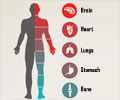Increasing positive emotion, increases well-being, and reduces stress in nurses. The article offers simple strategies that can be implemented by nurses to cope up with the work stress.
- ‘Positive Emotion Skills Intervention to Address Burnout in Critical Care Nurses’ offers strategies for critical care nurses to cope up with the workload
- Increasing positive emotion increases wellness and reduces stress
- Article includes several short practical examples for implementation to help nurses with busy schedules
Read More..
These strategies can be easily integrated into the busy lives of nurses. It has both individual as well as team applications.
“To fully address burnout in nursing, organizational change is necessary. However, such change takes time, resources, and effort to implement. In the meantime, individual-level interventions such as ours can help address burnout and compassion fatigue” said co-author Elaine Cheung.
Strategies to Improve Positive Emotions
- Noticing Positive Events – Enjoy positive moments that happen every day. Positive moments may include a patient recovering or even having meaningful interactions.
- Capitalizing – Spread the positive moments to other people either by telling a friend or posting on social media. Try to strengthen the connection between the positive event and the emotions.
- Gratitude – Always be thankful and express the gratitude to others.
- Positive Reappraisal – Look at negative events from a different perspective and take it positively.
- Mindfulness - Concentrate on the present moment. Spend time to incorporate mindfulness by adding formal meditation or informal activities into workplace activities.
- Personal Strengths – Identify and appreciate your colleagues’ strengths and talents.
- Attainable Goals – Assign personal and team goals during hectic and stressful times. The goals would help gain a sense of control.
- Self- Compassion – Always be kind and understanding towards other people. Make it a habit to share any personal experiences with error or feelings openly and resolve them.
- Compassion Towards Others – Try to help your colleagues with small gestures. It will provide emotional support and also build collaboration and teamwork.
The elements were originally tested in population coping with health-related stress.
However, the authors conducted a modification process to implement a customized pilot program for medical students. The program included four-hour-long sessions, which was integrated into the mandatory medical school curriculum. Students also had access to online exercises and resources.
What are the Other Articles in the Series?
“The NASEM report is an encouraging step as we try to develop interventions to mitigate symptoms of distress, improve well-being, build resilience, and improve overall clinician and patient satisfaction with the healthcare environment. We must continue to seek solutions and make caregiver well-being a priority.”, said Meredith Mealer, editor of the symposium.
In Conclusion, the article contains steps that could help critical care nurses to cope more effectively with workplace stress.
Source-Medindia











